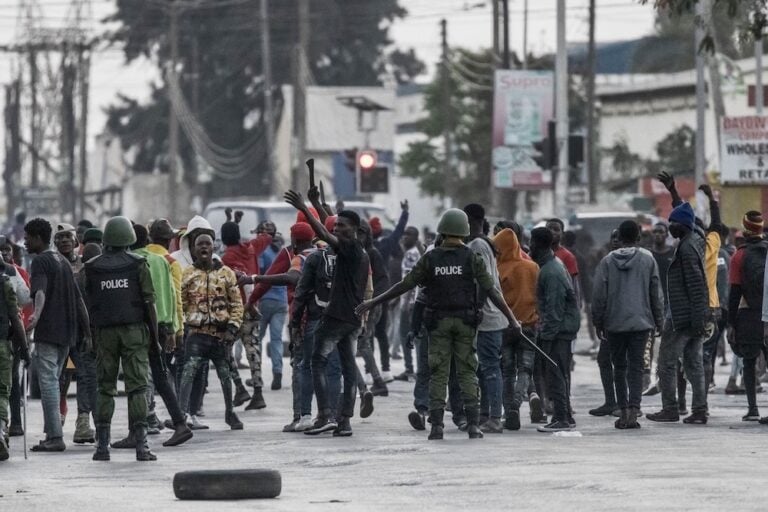(HRW/IFEX) – The following is a Human Rights Watch press release: **Updates IFEX alerts of 25 May 1999** ZAMBIAN GOVERNMENT CRACKS DOWN ON MEDIA, OPPOSITION (Paris, May 26, 1999) – Human Rights Watch today called for Zambia’s donors to continue to attach clear human rights benchmarks for the release of payments support, in light of […]
(HRW/IFEX) – The following is a Human Rights Watch press release:
**Updates IFEX alerts of 25 May 1999**
ZAMBIAN GOVERNMENT CRACKS DOWN ON MEDIA, OPPOSITION
(Paris, May 26, 1999) – Human Rights Watch today called for Zambia’s donors
to continue to attach clear human rights benchmarks for the release of
payments support, in light of the Zambian government’s continued human
rights violations. Today in Paris, the donors, known as the World Bank
Consultative Group on Zambia, will discuss Zambia’s human rights record.
Balance of payments support was suspended by a number of governments in 1996
because of human rights abuses committed by the Zambian government. Since
then,
balance of payments support has been tied to a number of conditions,
including human rights. On May 27-28, 1999, the Consultative Group will
discuss what types of conditions should remain.
“We expected improvements in the government’s rights record since last May’s
consultative group meeting,” said Peter Takirambudde, the executive
director for Africa at Human Rights Watch. “Instead, there is a growing
pattern of harassment against the independent media and the opposition.”
In a sixteen-page memorandum presented to donors today, Human Rights Watch
documents the government’s crackdown on the independent media and the
opposition. At the end of the last Consultative Group meeting in May 1998,
the head of the Zambian government delegation, Edith Nawakwi, Minister of
Finance and Economic Development, stated that “the government wants a clean
and good human rights record. We are a leader in the liberation struggles of
southern Africa. We want to be a leader on human rights.”
Human Rights Watch’s research in Zambia since the last Consultative Group
meeting has shown that despite the Minister’s fine words, Zambia is far from
being a ‘leader of human rights.’ In March 1999, the Zambian government
moved against the independent Post newspaper, charging twelve journalists
with espionage in an effort to suppress legitimate debate on a matter of
public interest, the crisis in bilateral relations with Angola. Opposition
political parties have also come under intense government scrutiny. The
government uses bureaucratic obstacles to inhibit opposition campaigns, and
uses the Zambia Revenue Authority to intimidate opposition leaders and
supporters.
Former President of Zambia and opposition United National Independence Party
(UNIP) leader Kenneth Kaunda has also been harassed. On March 31, 1999
Kaunda found his nationality questioned in a court judgment on a petition
filed by ruling party supporters. Government officials in their efforts to
undermine, intimidate and silence the opposition have also increasingly
questioned the ethnic origins of their critics, as a way of possibly denying
them citizenship. The nationality of many of these individuals had been
recognized without challenge from the inception of the Zambian state in 1964
until the current government identified them as opposition.
Kaunda’s car was also shot at and damaged on March 31, 1999 by an
unidentified gunman outside his residence in Lusaka. Human Rights Watch has
examined the car and the scene of the incident and is in no doubt that an
assault rifle was used and that several shots were fired. A police inquiry
into this shooting has not made its findings public.
“We too want to see Zambia as a leader in Africa on human rights,” said
Takirambudde. “But this needs positive actions, not nice words, followed by
misdeeds.”
The full text of the memorandum can be found on our website at www.hrw.org


